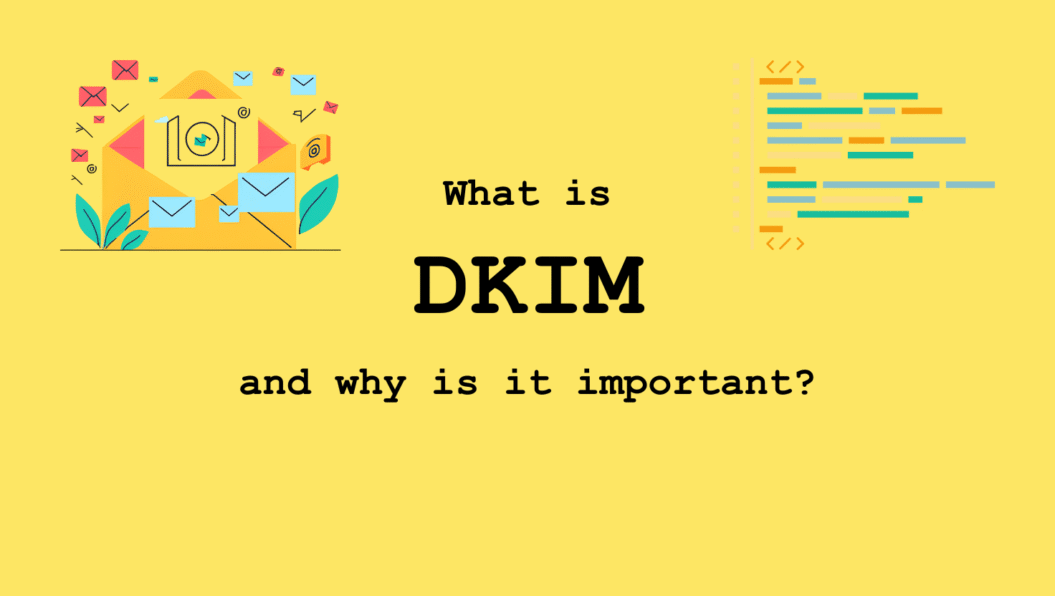If you are sending emails for your business, making sure they actually land in inboxes - and that they are trusted when they get there - is more important than ever.
SPF, DKIM, and DMARC are three behind-the-scenes tools that help protect your emails, your brand, and your deliverability.
In this short series, we will walk through what each one does, why they matter, and how getting them set up properly gives your email marketing a serious edge.
TL;DR
DKIM (DomainKeys Identified Mail) adds a digital signature to your emails to prove they’re genuinely from you. It helps protect your brand, stops emails being tampered with in transit, and improves your chances of landing in the inbox instead of spam. If you’re doing email marketing, especially B2B, setting up DKIM properly is essential.
If you have spent any time poking around in the world of email marketing, chances are you have stumbled across three mysterious-looking acronyms: SPF, DKIM, and DMARC. Today, we are going to talk about DKIM, what it is, why it matters, and why you really should not ignore it if you care about whether your emails actually reach people.
So, what is DKIM?
DKIM stands for DomainKeys Identified Mail. It is a way for the receiving mail server (such as Gmail, Outlook, and others) to check whether an email really came from you and has not been tampered with somewhere along the way. Think of it like sealing a letter with wax and a personalised stamp. If the seal is intact and it is your unique stamp, the recipient knows it is genuinely from you.
Technically speaking, DKIM works by attaching a digital signature to your emails. This signature gets created using a private key, a bit like a secret handshake, that only you (or more specifically, your mail server) have. Then, when the email arrives at its destination, the receiving server checks that signature against a public key you have published in your domain’s DNS settings. If everything matches up, the server knows it can trust the email.
Why is DKIM important for email marketing?
Good question. In fact, here is why it really matters:
1. Deliverability
Without DKIM, your emails are far more likely to get stuck in spam folders or not delivered at all. Email providers are getting stricter by the day about who they let into the inbox. If you are not authenticating your emails properly, they will assume the worst.
(And honestly, can you blame them? There are enough dodgy emails flying about as it is.)
2. Protecting Your Reputation
Your domain is like your brand’s online passport. If you are not using DKIM, someone else could send emails pretending to be you. Yes, this actually happens. Spoofing like that can trash your reputation faster than you can say "unsubscribe".
Having DKIM set up tells the world you are serious about security and that you value your contacts enough to protect them too.
3. It is Becoming a Requirement
In 2024, Google and Yahoo started cracking down hard. They have made it very clear: if you are sending bulk emails and you have not set up DKIM (along with SPF and DMARC), you will start seeing much lower deliverability. In some cases, your emails might not be delivered at all.
In other words, it is not just a “nice to have” anymore. It is essential.
But setting it up sounds complicated…
It is not nothing, but it is definitely doable, especially if you have someone techie nearby or a good email provider. Usually, it just means adding a few DNS records (your email platform should give you the exact ones you need) and doing a bit of testing to make sure it is all working properly.
The key is: do it once, do it right, and it will quietly work away in the background, making your life much easier.
Final Thoughts
If email marketing is part of how you find customers, stay in touch with clients, or grow your business (which it probably is if you are reading this), DKIM is not optional. It is a simple but powerful way of making sure your emails land where they are meant to, and that your brand stays trusted.
Because at the end of the day, the best marketing in the world will not help you if no one ever sees your emails.
